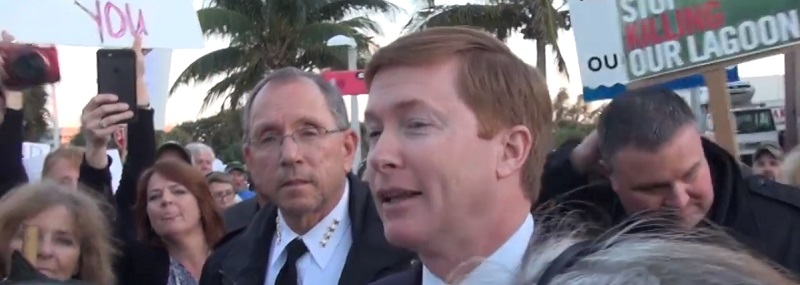Adam Putnam: Florida’s Worst Choice for Clean Water
Adam Putnam: Florida’s Worst Choice for Clean Water
Few politicians have done more than Putnam to loot and pollute the State of Florida. From steering tens of millions of taxpayer dollars to his family’s businesses–and hundreds of millions to the sugarcane companies backing his run for governor–to gutting clean water regulations and pollution standards, Putnam has dedicated his career to stealing and destroying public resources for the benefit of a handful of international billionaires happy to exploit Florida and Floridians and move on when there’s nothing left.

If you pay taxes, run a small business, own a home, or spend time in or near the water in Florida, Bullsugar has determined that Putnam is far and away the worst choice to represent you as our next governor.
Start with the pollution of Lake Okeechobee–from all sources and directions–which is now spewing a toxic stew of fecal contamination, industrial runoff, and excess fertilizer into the waters off Sanibel, and down the Treasure Coast.
The 2016 water policy bill that Putnam shepherded through the legislature eliminated any requirement to measure or limit pollution into the lake, letting all contributors off the hook and masking their shares of the contamination. The lake is dirtier than ever as a result, a breeding ground for cyanobacteria linked to brain diseases and cancers.
Horrific as that threat may be to the hundreds of thousands of Floridians exposed to algal toxins, and to the efforts to clean that water before it poisons what’s left of the Everglades, it’s great for the sugarcane industry. Florida Crystals and US Sugar are desperate to overturn the lawsuit holding them responsible for polluting water bound for Florida Bay, and Putnam’s work to foul it with untracked contamination gives them cover to claim they’re not the only offenders.
That same legislation passed more of the sugarcane industry’s clean-up costs on to Florida taxpayers, so in addition to using public land and public funding to build their treatment facilities, Florida Crystals and US Sugar use public money and resources to operate them. This state-funded corporate welfare pushed by Putnam comes on top of the sugarcane industry’s federal handouts, which Putnam also backed during his time in congress.
Last year Putnam came through with even more cash for the industry, funneling $383 million in Hurricane Irma relief to cover sugarcane losses–roughly 80% of the crop’s value–just before the USDA revealed near-record sugarcane yields. Whether the sugar companies lied about their losses or Putnam delivered this gift without being asked, the industry got massive public assistance it didn’t need. Meanwhile little or nothing went to scores of small businesses that truly needed help and still haven’t recovered.
The sugarcane industry has been no less generous with Putnam, but the thousands given to him directly by Florida Crystals and US Sugar, or laundered through political parties and PACs, probably fall short of the millions he’s taken personally from public sources. One 2005 land deal alone, brokered through the South Florida Water Management District, netted Putnam and his family $25.5 million from Florida taxpayers for a tract valued at $5.5 million–enough to finance a string of political campaigns. And enough to worry the Putnams’ attorney, who got an additional $3.9 million from taxpayers for his work on the deal, and wrote to SFWMD property appraiser Ruth Clemens, “Do you think any reporters will pick up on the settlement?”
They did, but if legal authorities ever picked up on it, no public investigation came to light.
Neither was there a public investigation of Putnam’s secret hunting trip to Texas’ King Ranch in 2013 with Rick Scott, Matt Caldwell (now running for Putnam’s agriculture commissioner seat), and others, paid for by sugar executives–a potential violation of Florida’s gift ban. When the media found out, Putnam claimed the trip was “like a fundraiser,” and run by the state’s Republican party, but party officials didn’t agree. Putnam later said he’d taken the trips–he couldn’t remember how many–for “campaign purposes” and because he didn’t play golf.
Putnam didn’t need the trips to convince Florida’s sugar companies to back him–the industry had been bankrolling him for more than a decade by then. In the US House he’d already come through again and again for Florida’s polluters, blocking Clean Water Act protections for local waters, easing reporting requirements for toxic releases and sewage spills, voting against drinking water and waste treatment improvements. And of course, the industry could count on Putnam to oppose any effort to reform the US Sugar program and the subsidies that fund its political activities.
While Putnam’s career has helped the billionaire families behind US Sugar and Florida Crystals to become even more entrenched and influential in Florida politics, almost no one else has benefitted. Putnam’s work to undermine pollution controls, manage water for his donors, and pass the costs to taxpayers have led to historic toxic algae blooms, seagrass die-offs, collapsing springs, unending red tides, fish kills, and mounting threats to millions of Floridians’ drinking water. And under his watch thousands of acres of public land–the key to cutting discharges to the coasts and restoring the Everglades and Florida Bay back to health–were dedicated instead to growing and cleaning up after sugarcane operations. All on the public dime.
The price for Adam Putnam’s gift of perpetually perfect growing conditions and zero regulation for the sugarcane industry is paid year after year by homeowners whose real estate values are choked by increasingly public water crises, businesses that rely on clean water and the tourists who no longer visit without checking the conditions, the boating and fishing and diving industries that find it harder and harder to survive as Florida waterways die.
No gubernatorial candidate has been worse for Florida’s water than Adam Putnam. We urge Floridians to vote for any other candidate to become our next governor.

